新版新概念英语第一册第39课课堂笔记
新概念课堂笔记第一册Lesson39-40

新概念课堂笔记第一册Lesson39-40 Word Studyfront【用法】n. 前面【词组】front door 前门front garden 前花园careful【用法】adj. 小心的,认确实【词组】be careful 小心,当心a careful man 一个专门认确实人【扩展】carefully adv. 小心地,认真地,认真地drop【用法】v. 使……掉下;放下v. 滴下,滴水v. 下降,降低【例句】I dropped my watch and it breaks. 我把手表弄掉了,它摔碎了。
She dropped the knife and fork and hurried to answer th e phone. 她放下刀叉赶忙去接。
Could you drop me at the station? 你等在车站把我放下吗。
Tears dropped from he r face. 泪珠从她脸上滑落。
He dropped his voice.他把声音放低了些。
The temperature dropp ed to 8℃below zero. 昨天气温下降到了摄氏零下8度。
show【用法】v. 给……看n. 展览;【词组】show sb. sth.= show sth. to sb.给某人看某物flower show 花展art show 艺术展send【用法】v. 送给;寄给;派遣【词组】send sb. sth.= send st h. to sb. 送给某人某物/寄给某人某物send sb. for/send for 派人去请【例句】I am going to send a letter to him. 我打算给他寄一封信。
Can you send me a present? 你能送给我一份礼物吗?Please send for a doct or. 请派人去请个大夫来。
新概念英语第一册第39课
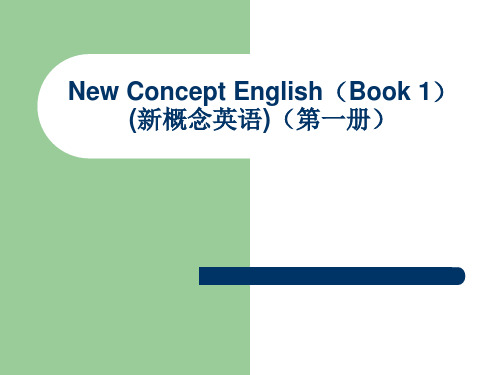
I am going to put it on the table.变一般疑问句 Are you going to put it on the table? 变回答 Yes, I am. / No, I’m not.变否定句 I am not going to put it on the table.划线 I Who is going to put it on the table? 划线 put it on the table. What are you going to do? 划线 it What are you going to put on the table? 划线 table Where are you going to put it?
going to = gonna
Lesson 40 What are you going to do? 你准备做什么? I’m going to… 我准备……
New words and expressions
show
[ʃəʊ] v. 给……看 send [send] v. 送给 take [teik] v. 带给
★ show
Don’t drop it! Drop me a line/letter.给我写信。 drop sb. a line 给某人写一封信 e.g. Drop me a line when you are free. 你有空给我写一封信。
n. 滴 e.g. a drop of water 一滴水 e.g. some drops of water 几滴水
练习 She is going to show the flowers to her mother. 1.一般疑问句 2.回答 3.否定句 4.划线She 5.划线show the flowers to her mother 6.划线 the flowers 7.划线 her mother Whom is she going to show the flowers to?
新概念英语第一册39课知识分享
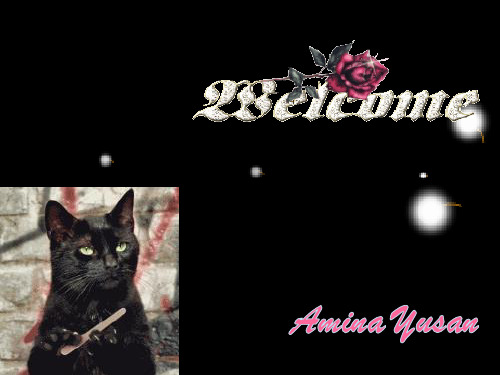
Be quiet, please.(P
Be kind to our sister.
(对姊妹要和善。——劝告)
Watch your steps.
(走路小心。——警告)
Look out!Danger!
(小心!危险!——强烈警告,已如感叹句)
❖ 头脑风暴:说祈使句。
❖The vase is in front of you.
❖There is a blackboard in the front of the classroom.
—Is this your son's sweater? —No. His is on the chair ______ the
desk.
Grammar in use
❖ 定义 用于表达命令、请求、劝告、警告、 禁止等的句子叫做祈使句,祈使句最常 用于表达命令,因此在学校文法中也常 称为命令句。
祈使句因对象(即主语)是第二人称, 所以通常都省略。祈使句的动词都为一 般现在时,句末则使用句号来表示结束。
❖ Go and wash your hands.
(别傻了。) 祈使句也常把主语“You”表达出来,使对方听起 来觉得柔和些,例如:
You go and tell him, Chris.
(克立斯你去告诉他。)
❖Don’t drop it! ❖祈使句
❖Stand up. Don’t stand up. ❖Sit down. Don’t sit down.
2. Does Sam want her to do that?
3. So, what is Sam going to do with the vase?
4. Finally, where is the vase?
新概念英语1册39课知识点总结
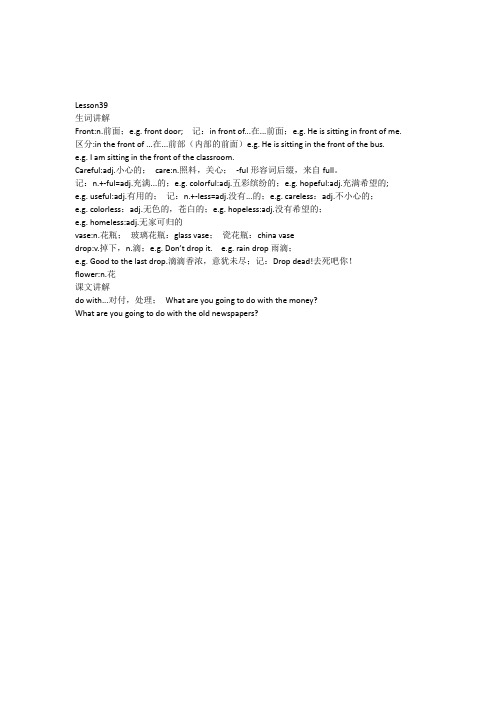
Lesson39
生词讲解
Front:n.前面;e.g. front door; 记:in front of...在...前面;e.g. He is sitting in front of me.区分:in the front of ...在...前部(内部的前面)e.g. He is sitting in the front of the bus. e.g. I am sitting in the front of the classroom.
Careful:adj.小心的;care:n.照料,关心;-ful形容词后缀,来自full。
记:n.+-ful=adj.充满...的;e.g. colorful:adj.五彩缤纷的;e.g. hopeful:adj.充满希望的; e.g. useful:adj.有用的;记:n.+-less=adj.没有...的;e.g. careless:adj.不小心的;
e.g. colorless:adj.无色的,苍白的;e.g. hopeless:adj.没有希望的;
e.g. homeless:adj.无家可归的
vase:n.花瓶;玻璃花瓶:glass vase;瓷花瓶:china vase
drop:v.掉下,n.滴;e.g. Don’t drop it. e.g. rain drop雨滴;
e.g. Good to the last drop.滴滴香浓,意犹未尽;记:Drop dead!去死吧你!
flower:n.花
课文讲解
do with...对付,处理;What are you going to do with the money?
What are you going to do with the old newspapers?。
新概念英语第一册课堂笔记Lesson 39 Don’t drop it!
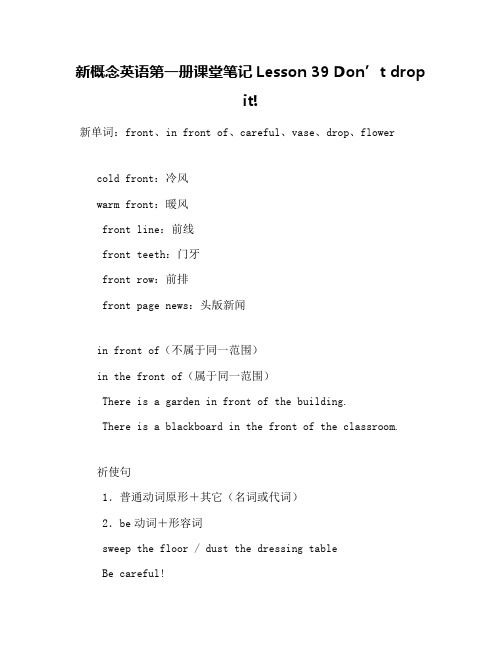
新概念英语第一册课堂笔记Lesson 39 Don’t dropit!新单词:front、in front of、careful、vase、drop、flowercold front:冷风warm front:暖风front line:前线front teeth:门牙front row:前排front page news:头版新闻in front of(不属于同一范围)in the front of(属于同一范围)There is a garden in front of the building.There is a blackboard in the front of the classroom.祈使句1.普通动词原形+其它(名词或代词)2.be动词+形容词sweep the floor / dust the dressing tableBe careful!Be quiet!祈使句的否定形式是在其前边加Don’tDon’t be silly!care n. & v. 护理skin and hair caremedical care / special care 医疗护理/特殊护理Cross the road with care!take care of / look aftercare v. 在乎I don’t care about money.I don’t care (about) you.I don’t care (about) what people think.care for 喜欢(常用于否定句和疑问句)She doesn’t really care for red wine.flour:面粉flower:各种各样的花草bloom:只供观赏的花blossom:开完花结果实do withWhat are you going to do?What are you going to do with the vase?★ TextLesson thirty-nine:Don’t drop it!What are you going to do with that vase, Penny?I’m going to put it on this table, Sam.Don’t do that.Give it to me.What are you going to do with it?I’m going to put it here, in front of the window.Be careful.Don’t drop it!Don’t put it there, Sam.Put it here, on this shelf.There we are!It’s a lovely vase.Those flowers are lovely, too.What are you going to do with that vase, Penny? 助动词Don’t do that. 实义动词。
新概念英语第一册Lesson+39+Don`t+drop+it-Lesson+40讲义
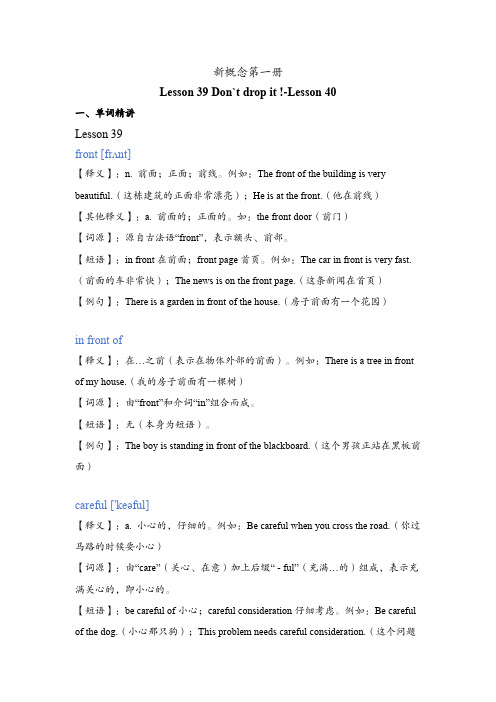
新概念第一册Lesson 39 Don`t drop it !-Lesson 40一、单词精讲Lesson 39front [frʌnt]【释义】:n. 前面;正面;前线。
例如:The front of the building is very beautiful.(这栋建筑的正面非常漂亮);He is at the front.(他在前线)【其他释义】:a. 前面的;正面的。
如:the front door(前门)【词源】:源自古法语“front”,表示额头、前部。
【短语】:in front在前面;front page首页。
例如:The car in front is very fast.(前面的车非常快);The news is on the front page.(这条新闻在首页)【例句】:There is a garden in front of the house.(房子前面有一个花园)in front of【释义】:在…之前(表示在物体外部的前面)。
例如:There is a tree in front of my house.(我的房子前面有一棵树)【词源】:由“front”和介词“in”组合而成。
【短语】:无(本身为短语)。
【例句】:The boy is standing in front of the blackboard.(这个男孩正站在黑板前面)careful ['keəful]【释义】:a. 小心的,仔细的。
例如:Be careful when you cross the road.(你过马路的时候要小心)【词源】:由“care”(关心、在意)加上后缀“ - ful”(充满…的)组成,表示充满关心的,即小心的。
【短语】:be careful of小心;careful consideration仔细考虑。
例如:Be careful of the dog.(小心那只狗);This problem needs careful consideration.(这个问题需要仔细考虑)【例句】:He is a careful worker.(他是一个仔细的工人)vase [vɑ:z, veis, veiz]【释义】:n. 花瓶。
新概念第一册39课 Lesson 39
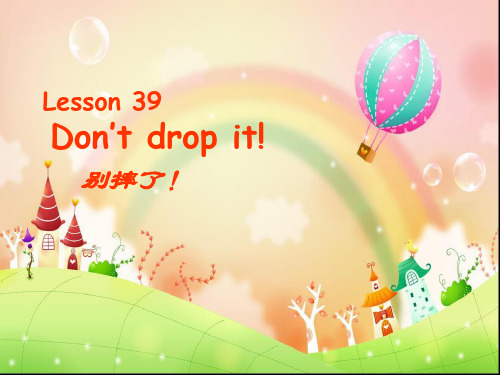
一滴水
flower n. 花 a bunch of flowers 一束花
练一练:
翻译下面的句子: 1、她坐在梳妆台前面。 2、客厅前面有一幅照片。 3、他们正认真地学英语。 1、She sits in front of the dressing table. 2、There is a photo in the front of the living room. 3、They are learning English carefully.
我准备把它放在这儿,放在窗前。 小心点!别摔了!
PENNY: Don't put there, Sam. Put it here, on this shelf. Don’t put there.否定祈使句,不要放在那里。
别放在那儿,萨姆。放在这儿,这个架子上。
SAM: There we are! It’s a lovely vase. PENNY: Those flowers are lovely, too. There we are!可以翻译为:放好了 lovely 可爱的 too用在肯定句句末,也…
Text课文Fra bibliotek SAM: What are you going to do with that vase, Penny? PENNY: I’m going to put it on this table, Sam.
be going to表示一般将来时 ,打算做 do with…,处理…,这里用特殊疑问句What引导, 表示“你打算怎么处理…?” it在这里代指the vase, on this table在桌子上,表 示地点 你打算如何处理那花瓶? 我打算把它放在这个桌子上。
新概念课堂笔记 第一册 Lesson 39-40

新概念英语课堂笔记第一册Lesson 39-40front【用法】n. 前面【词组】front door 前门front garden 前花园careful【用法】adj. 小心的,仔细的【词组】be careful 小心,当心a careful man 一个很认真的人【扩展】carefully adv. 小心地,仔细地,认真地drop【用法】v. 使……掉下;放下v. 滴下,滴水v. 下降,降低【例句】I dropped my watch and it breaks. 我把手表弄掉了,它摔碎了。
She dropped the knife and fork and hurried to answer the phone. 她放下刀叉赶紧去接电话。
Could you drop me at the station? 你等在车站把我放下吗。
Tears dropped from her face. 泪珠从她脸上滑落。
He dropped his voice. 他把声音放低了些。
The temperature dropped to 8℃below zero. 昨天气温下降到了摄氏零下8度。
show【用法】v. 给……看n. 展览;【词组】show sb. sth.= show sth. to sb.给某人看某物flower show 花展art show 艺术展send【用法】v. 送给;寄给;派遣【词组】send sb. sth.= send sth. to sb. 送给某人某物/寄给某人某物send sb. for/send for 派人去请【例句】I am going to send a letter to him. 我打算给他寄一封信。
Can you send me a present? 你能送给我一份礼物吗?Please send for a doctor. 请派人去请个医生来。
What are you going to do with that vase, Penny?【译文】你打算如何处理那个花瓶,彭妮?【用法】○1本句是一般将来时态be going to的特殊疑问句形式。
- 1、下载文档前请自行甄别文档内容的完整性,平台不提供额外的编辑、内容补充、找答案等附加服务。
- 2、"仅部分预览"的文档,不可在线预览部分如存在完整性等问题,可反馈申请退款(可完整预览的文档不适用该条件!)。
- 3、如文档侵犯您的权益,请联系客服反馈,我们会尽快为您处理(人工客服工作时间:9:00-18:30)。
新版新概念英语第一册第39课课堂笔记 Lesson 115 Knock, Knock
Is there anyone at Home?
Is everything very quiet?
What is Jim sure?
What does Helen think?
What does Helen ask Jim to do?
Jim is knocking at the door.
But there is no one at Home.
Everything is very quiet.
Jim is sure there is no one at Home.
I am sure there is no one at Home.
But Helen thinks it is impossible.
Because Carol and Tom invited them to lunch.
look through
ask sib. to do sth.
Helen asks Jim to look through the window.
What can Jim see?
What does Helen ask Jim to do?
Is everyone in the garden?
Why are they having lunch in the garden?
Let's go Home.
try
Let's try the back door.
Helen asks Jim to try the back door.
Everyone is in the garden.
Everyone wants to have lunch in the garden. Everyone wants to stay in the warm house in winter. What does Jim want to do?
Jim wants to have a glass of beer.
But Carol says there is no beer left.
Carol asks Jim to have some lemonade.
She is only joking.
Lesson 117 Tommy's breakfast
[词汇]
dinning room(hall) 饭厅
coin n. 硬币
mouth n. 嘴
swallow v. 吞下
later adv. 后来
toilet n. 厕所,盥洗室
过去实行时和过去完成时
现在实行时,一般过去时,现在完成时,过去实行时,过去完成时。
